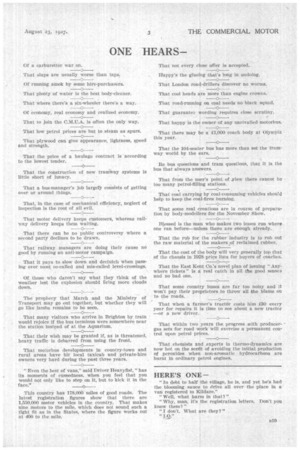ONE HEARS
Page 37

If you've noticed an error in this article please click here to report it so we can fix it.
Of a carburetter war on.
That slaps are usually worse than taps.
Of running amok by some hire-purchasers.
That plenty of water is the best body-cleaner.
That where there's a six-wheeler there's a way.
Of economy, real economy and realized economy.
That to join the C.M.U.A. is often the only way.
That low petrol prices are but to steam as spurs.
That 'plywood can give appearance, lightness, speed and strength.
That the price of a haulage contract is according to the lowest tender.
That the construction of new tramway systems is little short of lunacy.
That a bus-manager's job largery consists of getting over or around things.
That, in the case of mechanical efficiency, neglect of inspection is the root of all evil.
That motor delivery keeps customers, whereas railway delivery keeps them waiting.
That there can be no public controversy where a second party declines to be drawn.
That railway managers are doing their cause no goocr by running an anti-motor campaign.
That it pays to slow down and declutch when passing over most so-called and mis-called level-crossings.
• Of those who daren't say what they think of the weather lest the explosion should bring more clouds down.
The prophecy that March and the Ministry of Transport may go out together, but whether they will go like lambs remains to be seen.
That many visitors who arrive in Brighton by train would rejoice if the bus terminus were somewhere near the station instead of at the Aquarium.
That their wish may be granted if, as is threatened, heavy traffic is debarred from using the front.
That motorbus developments in country-town and rural areas have hit local taxicab and private-hire owners very hard during the past three years.
"Even the best of vans," said Driver Heavyfist, "has its moments of cussedness, when you feel that you would not only like to step on it, but to kick it in the face."
This country has 178,000 miles of good roads. The latest registration figures show that there are 1,550,000 motor vehicles in the country. That makes nine motors to the mile, which does not sound such a • tight fit as in the States, where the figure works out at 400 to the mile. That not every close offer is accepted.
Happy's the glueingthat's long in undoing.
That London road-drillers discover no worms.
That cool heads are more than engine crowns. That road-running on coal needs no black squad. That guarantee wording requires close scrutiny.
That happy is the owner of any unrivalled motorbus. • That there may be a £1,000 coach body at Olympia this year.
That the 104-seater bus has more than set the tramway world by the ears. .
Re bus questions and tram questions, that it is the bus that always answers.
That from the user's point of .yiew there cannot be too many petrol-filling stations.
That coal carrying by coal-consuming vehicles should help to keep the coal-fires burning.
That some real creations are in course of preparation by body-modellers for the November Show.
Blessed is the man who makes two buses run where one ran before—unless there are enough already. • That the rub for the rubber industry is to rub out the raw material of the makers of reclaimed rubber..
That the cost of the body will very generally top that of the chassis in 1928 price lists for buyers of coaches.
That the East Kent Co.'s novel plan of issuing "Anywhere tickets" is a real catch in all the good senses and no bad one.
That some country buses are far too noisy and it won't pay their proprietors•to throw all the blame on to the roads.
That when a farmer's tractor costs him £80 every year for repairs it is time to see about a new tractor —or a new driver.
That within two years the progress _with producergas sets for road work will exercise a permanent control upon petrol prices.
That chemists and experts in thermo-dynamics are now hot on the scent of avoiding the initial production of peroxides When non-aromatic hydrocarbons are burnt in ordinary petrol engines.




































































































